Science公布的125个科学前沿问题
- 格式:doc
- 大小:33.00 KB
- 文档页数:5

1. 人类大脑如何存储和处理信息?2. 宇宙中暗能量和暗物质的真实性是什么?3. 生命是如何在地球上起源的?4. 我们如何能够预测自然灾害?5. 量子物理学中薛定谔的猫到底是真实存在还是纯粹的理论?6. 深空探测可以为我们提供哪些关于地外生命的线索?7. 为什么黑洞对光线具有吸引力?8. 我们如何能够更好地预测气候变化?9. 在基因技术领域,我们的道德标准应该是如何界定的?10. 人工智能是否有可能超越人类智慧?11. 单细胞生物如何演化为复杂多细胞生物?12. 大爆炸理论可以解释宇宙的起源吗?13. 在医学领域,我们如何预防和治疗癌症?14. 量子计算机能够如何改变我们的生活和科学研究?15. 恒星如何形成和熄灭?16. 在宇宙中是否存在可以支持生命的其他星球?17. 地球上生命的多样性是如何产生的?18. 我们如何能够更好地预测火山喷发?19. 为什么质子和中子会结合在一起形成原子核?20. 生物钟如何影响人类的生活和健康?21. 我们如何能够更好地利用可再生能源?22. 关于细胞自噬的研究有什么重要意义?23. 我们如何能够更好地预防和治疗传染病?24. 古代文明中的科学成就如何影响现代科学?25. 未来的太空旅行是否可能成为现实?26. 在生物学领域,我们如何能够更好地理解遗传变异?27. 量子纠缠是否可以实现超光速通信?28. 研究干细胞是否可能为疾病治疗带来突破?29. 为什么物质之间存在引力?30. 人类的起源和迁徙过程是怎样的?31. 能否通过基因编辑来创造更健康的人类?32. 黑洞中的奇点是什么?33. 我们如何能够更好地了解大脑的工作原理?34. 宇宙中是否存在超越时间和空间的维度?35. 人类对地球环境造成了什么样的影响?36. 数学中的哥德巴赫猜想是否有可能被证明?37. 我们如何才能更好地利用基因工程来改善农作物和畜产?38. 关于梦境和意识之间的关系,我们了解多少?39. 为什么地球上存在如此多的物种?40. 数学中的费马大定理是否存在完美证明?41. 我们如何能够更好地了解宇宙中的暗物质?42. 生物质能源在可持续发展中的地位及其前景如何?43. 量子力学中的测不准原理到底是什么?44. 我们如何能够更好地利用生物技术来改善医学水平?45. 地球内部的磁场是如何产生的?46. 颠覆了牛顿物理学规律的相对论是如何被提出的?47. 我们如何能够更好地预防和治疗心理疾病?48. 类生物智能系统是否有可能实现?49. 为什么地球的大气层具有保护作用?50. 数学中的康托尔集是否有完美解释?51. 我们如何能够更好地利用纳米技术来改善能源和环保问题?52. 为什么地球上存在如此多的自然现象?53. 关于时间旅行的理论,我们究竟能否实现?54. 我们如何更好地理解人类对药物和毒品的依赖?55. 为什么地球上存在如此多的岩石和矿物?56. 数学中的哥德巴赫猜想是否有可能被证明?57. 我们如何能够更好地利用基因工程来改善农作物和畜产?58. 关于梦境和意识之间的关系,我们了解多少?59. 为什么地球上存在如此多的物种?60. 数学中的费马大定理是否存在完美证明?61. 我们如何能够更好地了解宇宙中的暗物质?62. 生物质能源在可持续发展中的地位及其前景如何?63. 量子力学中的测不准原理到底是什么?64. 我们如何能够更好地利用生物技术来改善医学水平?65. 地球内部的磁场是如何产生的?66. 颠覆了牛顿物理学规律的相对论是如何被提出的?67. 我们如何能够更好地预防和治疗心理疾病?68. 类生物智能系统是否有可能实现?69. 为什么地球的大气层具有保护作用?70. 数学中的康托尔集是否有完美解释?71. 我们如何能够更好地利用纳米技术来改善能源和环保问题?72. 为什么地球上存在如此多的自然现象?73. 关于时间旅行的理论,我们究竟能否实现?74. 我们如何更好地理解人类对药物和毒品的依赖?75. 为什么地球上存在如此多的岩石和矿物?76. 为什么牛顿的万有引力定律能够适用于如此广泛的物体?77. 我们如何更好地利用地热能来提供清洁能源?78. 关于大脑中的记忆机制,我们了解多少?79. 生物多样性对地球生态系统的影响如何?80. 我们如何能够更好地利用核能来解决能源危机?81. 历史上的科学发展对现代科学的影响有多大?82. 在医学领域,我们如何能够更好地利用基因测序技术来提高诊断水平?83. 为什么地球上存在如此多的气候类型?84. 数学中的哥德巴赫猜想最终是否有可能被证明?85. 我们如何更好地利用遗传工程技术来改善人类健康?86. 火星探测对我们了解宇宙和地球起源的意义是什么?87. 我们如何能够更好地了解大脑神经网络的工作原理?88. 为什么地球上存在如此多的生物群落?89. 数学中的费马大定理是否存在完美证明?90. 我们如何能够更好地了解量子物理学中的隐变量问题?91. 生物多样性对地球生态系统的影响如何?92. 我们如何能够更好地利用核能来解决能源危机?93. 历史上的科学发展对现代科学的影响有多大?94. 在医学领域,我们如何能够更好地利用基因测序技术来提高诊断水平?95. 为什么地球上存在如此多的气候类型?96. 数学中的哥德巴赫猜想最终是否有可能被证明?97. 我们如何更好地利用遗传工程技术来改善人类健康?98. 火星探测对我们了解宇宙和地球起源的意义是什么?99. 我们如何能够更好地了解大脑神经网络的工作原理?100. 为什么地球上存在如此多的生物群落?101. 数学中的费马大定理是否存在完美证明?102. 我们如何能够更好地了解量子物理学中的隐变量问题?103. 人类如何能够更好地适应特殊环境?104. 数学中的黎曼猜想是否有可能被证明?105. 我们如何能够更好地利用基因编辑来治疗细胞变异病?106. 为什么地球上存在如此多的环境问题?107. 关于宇宙膨胀模型,我们究竟了解多少?108. 我们如何能够更好地预防和治疗自然灾害引发的健康问题?109. 大脑如何能够更好地适应环境变化?110. 数学中的黎曼猜想是否有可能被证明?111. 我们如何能够更好地利用基因编辑来治疗细胞变异病?112. 为什么地球上存在如此多的环境问题?113. 关于宇宙膨胀模型,我们究竟了解多少?114. 我们如何能够更好地预防和治疗自然灾害引发的健康问题?115. 大脑如何能够更好地适应环境变化?116. 数学中的黎曼猜想是否有可能被证明?117. 我们如何能够更好地利用基因编辑来治疗细胞变异病?118. 为什么地球上存在如此多的环境问题?119. 关于宇宙膨胀模型,我们究竟了解多少?120. 我们如何能够更好地预防和治疗自然灾害引发的健康问题?121. 大脑如何能够更好地适应环境变化?122. 数学中的黎曼猜想是否有可能被证明?123. 我们如何能够更好地利用基因编辑来治疗细胞变异病?124. 为什么地球上存在如此多的环境问题?125. 关于宇宙膨胀模型,我们究竟了解多少?。

science发布的最前沿的125个科学问题科学是人类探索自然世界的一门知识体系,旨在解答人们对宇宙、生命、物质和能量的基本疑问。
而作为科学的基础,科学问题就是科学家们在研究中提出的未解之谜,是推动科学进步的关键。
在这篇文章中,我将介绍科学发布的最前沿的125个科学问题。
下面是其中一部分世界上最有潜力的科学问题:1.宇宙的起源是什么?是一次大爆炸还是其他什么事件?2.宇宙中的黑暗物质是什么?它的存在对宇宙演化有什么影响?3.宇宙中的黑暗能量是什么?它是如何驱使宇宙膨胀的?4.引力波的存在意味着什么?它们能否揭示宇宙的基本规律?5.宇宙中是否存在其他智慧生命体?我们如何与它们进行沟通?6.生命是如何起源的?是地球上的化学反应还是其他更加奇特的过程?7.地球上的生命是如何适应极端环境的?各种极端环境有何共同之处?8.生物进化的驱动力是什么?是环境变化还是内部基因的突变?9.人类的意识和思维是如何产生的?我们是否能够复制或创造人工意识?10.量子力学的本质是什么?量子纠缠是否实际存在?11.时光旅行是否可能?如果可能,我们是否能够找到实现时光旅行的方法?12.如何实现类似于电影《盗梦空间》中的梦境控制和潜意识读取?13.新型材料的研究能否实现无限的储能和高效的传输?14.化学反应的速率和机理是如何控制的?如何提高化学反应的效率?15.如何解决空气和水污染问题?如何减少对地球气候的影响?这些问题包涵了不同领域的科学研究,从宇宙、生命到物质和能量,全面展示了科学研究的广度和深度。
这些问题不仅仅是科学家的兴趣所在,也直接关系到人类未来的发展。
科学问题的提出不仅仅是为了获取答案,更重要的是推动科学的发展。
在追寻这些问题的过程中,科学家们会进行大量的理论探索和实验研究,这些探索和研究不仅会带来新的发现,也会为技术创新和社会进步提供基础。
然而,我们必须认识到科学问题的解答并非一蹴而就,有些问题可能需要几十年甚至数百年的时间来解决。

全世界最前沿的125个科学问题在庆祝Science 创刊125周年之际,Science 公布了125个最具挑战性的科学问题。
了解前沿科学研究方向,对你的成长或许有所帮助。
简单归纳统计这125个问题,其中涉及生命科学的问题占46%,关系宇宙和地球的问题占16%,与物质科学相关的问题占14%以上,认知科学问题占9%。
其余问题分别涉及数学与计算机科学、政治与经济、能源、环境和人口等。
在今后1/4个世纪的时间里,人们将致力于研究解决这些问题。
其中,前25个被认为是最重要的问题.这125个问题如下:1、宇宙由什么构成?2、意识的生物学基础是什么?3、为什么人类基因会如此之少?4、遗传变异与人类健康的相关程度如何?5、物理定律能否统一?6、人类寿命到底可以延长多久?7、是什么控制着器官再生?8、皮肤细胞如何成为神经细胞?9、单个体细胞怎样成为整株植物?10、地球内部如何运行?11、地球人类在宇宙中是否独一无二12、地球生命在何处产生、如何产生?13、什么决定了物种的多样性?14、什么基因的改变造就了独特的人类?15、记忆如何存储和恢复?16、人类合作行为如何发展?17、怎样从海量生物数据中产生大的可视图片?18、化学自组织的发展程度如何?19、什么是传统计算的极限?20、我们能否有选择地切断某些免疫反应?21、量子不确定性和非局部性背后是否有更深刻的原理?22、能否研制出有效的HIV疫苗?23、温室效应会使地球温度达到多高?24、什么时间用什么能源可以替代石油?25、地球到底能负担多少人口?26、宇宙是否唯一?27、是什么驱动宇宙膨胀?28、第一颗恒星与星系何时产生、怎样产生?29、超高能宇宙射线来自何处?30、是什么给类星体提供动力?31、黑洞的本质是什么?32、正物质为何多于反物质?33、质子会衰变吗?34、重力的本质是什么?35、时间为何不同于其他维度?36、是否存在比夸克更小的基本粒子?37、中微子是其自己的反粒子吗?38、是否有解释所有相关电子系统的统一理论?39、人类能够制造最强的激光吗?40、能否制造完美的光学透镜?41、是否可能制造出室温下的磁性半导体?42、什么是高温超导性之后的成对机制?43、能否发展关于湍流动力学和颗粒材料运动学的综合理论44、是否存在稳定的高原子量元素?45、固体中是否有超流动性?如果有,如何解释?46、水的结构如何?47、玻璃态物质的本质是什么?48、是否存在合理化学合成的极限?49、光电电池的最终效率如何?50、核聚变将最终成为未来的能源吗?51、驱动太阳磁周期的原因是什么?52、行星怎样形成?53、是什么引发了冰期?54、使地球磁场逆转的原因是什么?55、是否存在有助于预报的地震先兆?56、太阳系的其他星球上现在和过去是否存在生命57、自然界中手性原则的起源是什么?58、能否预测蛋白质折叠?59、人体中的蛋白质有多少存在方式?60、蛋白质如何发现其作用对象?61、细胞死亡有多少种形式?62、是什么保持了细胞内的通行顺畅?63、为什么细胞的成分可以独立于。
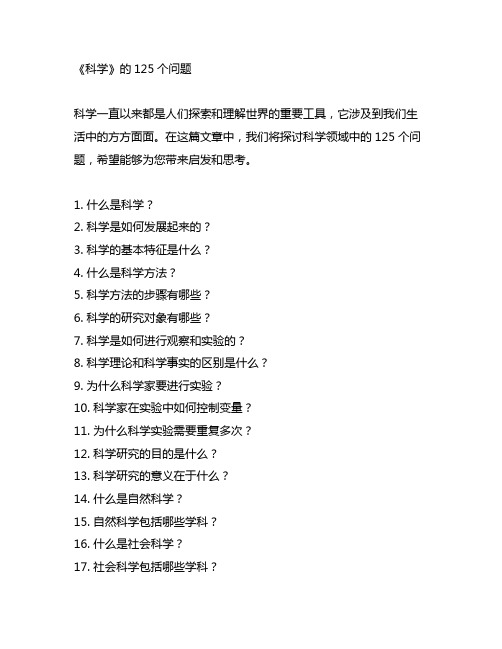
《科学》的125个问题科学一直以来都是人们探索和理解世界的重要工具,它涉及到我们生活中的方方面面。
在这篇文章中,我们将探讨科学领域中的125个问题,希望能够为您带来启发和思考。
1. 什么是科学?2. 科学是如何发展起来的?3. 科学的基本特征是什么?4. 什么是科学方法?5. 科学方法的步骤有哪些?6. 科学的研究对象有哪些?7. 科学是如何进行观察和实验的?8. 科学理论和科学事实的区别是什么?9. 为什么科学家要进行实验?10. 科学家在实验中如何控制变量?11. 为什么科学实验需要重复多次?12. 科学研究的目的是什么?13. 科学研究的意义在于什么?14. 什么是自然科学?15. 自然科学包括哪些学科?16. 什么是社会科学?17. 社会科学包括哪些学科?18. 什么是应用科学?19. 应用科学与基础科学有何区别?20. 科学的发展对人类社会的影响是什么?21. 科学技术是如何推动社会进步的?22. 为什么科学普及对社会至关重要?23. 科学教育的意义在于什么?24. 科学素养是什么?25. 为什么每个人都应该具备科学素养?26. 科学素养对个人和社会的影响是什么?27. 什么是科学道德?28. 科学道德的重要性是什么?29. 科学研究中的诚信和公正有何意义?30. 科学错误是如何纠正和修正的?31. 科学研究的权威性和可靠性如何保障?32. 科学研究的伦理问题是什么?33. 什么是伪科学?34. 如何识别伪科学?35. 伪科学的危害是什么?36. 为什么要避免伪科学?37. 什么是科学世界观?38. 科学世界观对认识世界的影响是什么?39. 什么是科学价值观?40. 科学价值观对人类社会的影响是什么?41. 什么是科学技术伦理?42. 科学技术伦理的重要性是什么?43. 科学研究中的社会责任是什么?44. 科学研究中的公共利益是什么?45. 科学研究中的隐私保护是什么?46. 科学研究中的安全风险是什么?47. 什么是科学革命?48. 科学革命对现代科学的影响是什么?49. 什么是科学精神?50. 科学精神对科学研究的意义是什么?51. 什么是科学探索的动力?52. 科学探索的动力对科学发展的影响是什么?53. 什么是科学技术创新?54. 科学技术创新对社会和经济的意义是什么?55. 什么是科学实验的基本要求?56. 科学实验的基本要求对实验结果的可靠性有何影响?57. 什么是科学研究的创新能力?58. 科学研究的创新能力的意义在于什么?59. 什么是科学研究的自主性?60. 科学研究的自主性对研究成果的影响是什么?61. 什么是科学研究的目标导向?62. 科学研究的目标导向对研究过程的影响是什么?63. 什么是科学研究的合作性?64. 科学研究的合作性对研究成果的影响是什么?65. 什么是科学研究的公开性?66. 科学研究的公开性对研究交流和合作的影响是什么?67. 什么是科学研究的符号语言?68. 科学研究的符号语言对科学交流的重要性是什么?69. 什么是科学研究的数据和信息?70. 科学研究的数据和信息对科学研究的意义是什么?71. 什么是科学研究的实践能力?72. 科学研究的实践能力对科学问题的解决有何影响?73. 什么是科学研究的逻辑推理能力?74. 科学研究的逻辑推理能力对科学证明的重要性是什么?75. 什么是科学研究的批判思维能力?76. 科学研究的批判思维能力对科学发现的意义是什么?77. 什么是科学研究的创造力?78. 科学研究的创造力对科学发展的推动作用是什么?79. 什么是科学研究的交流能力?80. 科学研究的交流能力对科学交流和合作的重要性是什么?81. 什么是科学研究的批判性思维?82. 科学研究的批判性思维对科学发现的意义是什么?83. 什么是科学研究的透明性?84. 科学研究的透明性对科学研究结果的可信度有何影响?85. 什么是科学研究的效率和效果?86. 科学研究的效率和效果对科学成果的意义是什么?87. 什么是科学研究的风险管理?88. 科学研究的风险管理对科学实验和研究的安全性有何影响?89. 什么是科学研究的责任和义务?90. 科学研究的责任和义务对科学家和科研机构的影响是什么?91. 什么是科学研究的伦理标准?92. 科学研究的伦理标准对研究过程和结果的影响是什么?93. 什么是科学研究的法律规定?94. 科学研究的法律规定对研究活动和成果的约束和保护作用是什么?95. 什么是科学研究的政策和规划?96. 科学研究的政策和规划对科学研究资源的分配和利用有何影响?97. 什么是科学研究的知识产权保护?98. 科学研究的知识产权保护对科学研究成果的转化和应用有何意义?99. 什么是科学研究的社会审查和监督?100. 科学研究的社会审查和监督对科学研究的公正和公信力有何影响?101. 什么是科学研究的质量评价和控制?102. 科学研究的质量评价和控制对科研成果的评价和应用管理有何意义?103. 什么是科学研究的国际合作?104. 科学研究的国际合作对科学成果的国际传播和影响有何意义?105. 什么是科学研究的跨学科和交叉研究?106. 科学研究的跨学科和交叉研究对科学发现和创新的推动作用是什么?107. 什么是科学研究的大科学项目?108. 科学研究的大科学项目对科学研究资源的集中配置和科学技术的发展有何影响?109. 什么是科学研究的基础理论和应用技术?110. 科学研究的基础理论和应用技术对科学研究发展和社会进步的重要性是什么?111. 什么是科学研究的重大科学问题和前沿研究领域?112. 科学研究的重大科学问题和前沿研究领域对科学发展和创新的引领作用是什么?113. 什么是科学研究的战略性布局和规划?114. 科学研究的战略性布局和规划对科学发展和国家安全战略的影响是什么?115. 什么是科学研究的科学与艺术结合?116. 科学研究的科学与艺术结合对科学研究优秀人才的培养和科学教育的推动作用是什么?117. 什么是科学研究的科技成果转化和产业化?118. 科学研究的科技成果转化和产业化对科学研究成果的应用和社会经济的发展作用是什么?119. 什么是科学研究的科学传播和科学普及?120. 科学研究的科学传播和科学普及对科学知识的传播和社会公众的科学素养提高作用是什么?121. 什么是科学研究的科学家形象和科学精神?122. 科学研究的科学家形象和科学精神对科学工作者的激励和科学研究的推动作用是什么?123. 什么是科学研究的科学伦理和科学修养?124. 科学研究的科学伦理和科学修养对科学家的行为规范和科学研究成果的可信度保障作用是什么?125. 什么是科学研究的科学未来和科学梦想?126. 科学研究的科学未来和科学梦想对科学研究的持续创新和科学研究的发展动力是什么?结语:科学研究是为了寻求真理和创新的一种探索活动,它是人类对世界认识和理解的重要途径。

science杂志公布的125个重大科学问题1. 宇宙中的暗物质和暗能量:科学家们已经确定我们所见到的物质只构成了宇宙总质量的约5%,然而,剩下的95%的暗物质和暗能量依然是一个未解之谜。
这些隐藏的物质和能量对宇宙的结构和演化有着重要影响,因此了解暗物质和暗能量的本质是当前天体物理学研究的重要课题。
2. 人类起源和进化:人类起源和进化是另一个重大科学问题。
科学家们一直在寻找人类遗传和生物学特征的起源,同时也在探索人类智力、决策能力和文化传承的进化过程。
深入了解人类起源和进化可以帮助我们更好地理解人类疾病的发生机制,以及未来人类的进化方向。
3. 癌症的防治:癌症是目前全球公共卫生的重大挑战之一。
科学家们正在努力寻找癌症的早期诊断方法以及更有效的治疗策略。
癌细胞的演化和扩散机制也是研究的焦点,希望从根本上解决癌症这一难题。
4. 全球气候变化:全球气候变化对人类和地球生态系统产生了巨大的影响。
科学家们正在努力研究气候变化的机制和趋势,并寻找减缓和适应气候变化的方法。
了解气候变化对地球的各个方面的影响,包括冰川融化、海平面上升以及极端天气事件的增加,对于制定应对气候变化的解决方案至关重要。
5. 生命起源和外生命存在:生命起源和外生命存在是一个极富争议的科学问题。
科学家们正在努力寻找生命起源的机制,以及在地球上和其他行星上是否存在外生命体的证据。
了解生命的起源和外生命的存在将重新定义我们对宇宙的理解和人类的地位。
6. 能源替代和可持续发展:寻找可替代化石燃料的能源,以实现可持续发展,是当前全球面临的重要挑战之一。
科学家们正在研究太阳能、风能、生物能和核能等各种可再生能源,并探索高效能源转换和储存技术,以满足未来对能源的可持续需求。
7. 大脑和意识的本质:大脑和意识的本质是神经科学和哲学界关注的热门话题。
科学家们正在通过研究神经元之间的连接机制和脑电活动,探索大脑运作的奥秘,并试图理解意识的起源和本质。
这一领域的研究有望为认知障碍和神经退行性疾病的治疗提供新的思路。

我国海洋科学发展现状与未来展望海洋是生命的摇篮,是支撑地球宜居性的关键空间,是地球系统科学发展的重要引擎。
海洋是地球气候系统的调节器,对地球系统的热量循环、水循环、物质循环等有重要的调控作用,深入认识海洋动力过程及能量物质循环过程是理解和应对全球及区域气候变化的关键。
海洋也孕育了地球上最大的生态系统,具有巨大的服务功能和价值,认识蓝色生命系统过程与规律、合理开发和保护蓝色生物资源是支撑人类社会可持续发展的重大战略需求。
随着人口持续增长,人类对能源、粮食、空间、矿产、淡水等资源提出了更加迫切的需求。
与此同时,随着人类活动的加剧,温室气体、污染物(如重金属、持久性有机污染物、微塑料)等排放量增加,地球气候系统正在急速变化,环境和生态系统正在迅速退化。
认识海洋、经略海洋关系到人类社会的兴衰。
然而到目前为止,广袤深邃的海洋只有5%的区域被人类探索。
未知的海洋蕴藏着无尽的资源,是重大科学发现和颠覆性技术创新的摇篮。
海洋独特的生命过程,特别是热液、冷泉以及深海暗生命系统等一系列重大发现,颠覆了人类对于生命极限的认识,有望通过人类的探索解答地球生命起源这一终极问题。
海洋作为地球系统的〃血液〃,是联系地球系统各圈层的纽带(图1),开展以海洋为核心的多圈层耦合研究,是催生地球科学重大发现、创建和发展地球系统科学新理论的必由之路。
图1地球系统多圈层耦合小意图自20世纪中期以来,围绕海洋中的物理、化学、生物和地质过程及其对气候和生态系统的影响,全球海洋科学界以国际合作的方式发起了一系列国际大科学计划,例如海洋与气候方面的世界海洋环流实验(WoCE)、Argo全球海洋观测网、耦合模式比较计划(CMIP),海洋生物地球化学和生态系统方面的全球海洋通量联合研究计划(JGoFS)和全球海洋生态系统动力学研究计划(G1oBEC),海洋地质和地球系统科学方面的国际大洋发现计划(IoDP)、国际地球科学计划(IGCP)等。
这些国际大科学计划极大地推动了海洋科学各个分支的发展及其与其他学科的交叉融合。
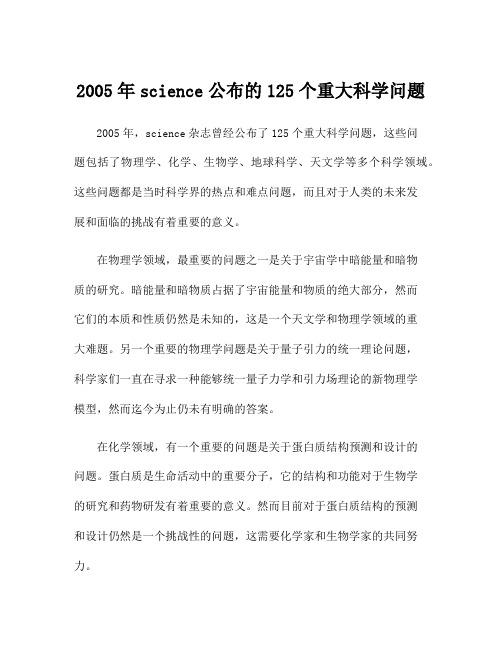
2005年science公布的125个重大科学问题2005年,science杂志曾经公布了125个重大科学问题,这些问题包括了物理学、化学、生物学、地球科学、天文学等多个科学领域。
这些问题都是当时科学界的热点和难点问题,而且对于人类的未来发展和面临的挑战有着重要的意义。
在物理学领域,最重要的问题之一是关于宇宙学中暗能量和暗物质的研究。
暗能量和暗物质占据了宇宙能量和物质的绝大部分,然而它们的本质和性质仍然是未知的,这是一个天文学和物理学领域的重大难题。
另一个重要的物理学问题是关于量子引力的统一理论问题,科学家们一直在寻求一种能够统一量子力学和引力场理论的新物理学模型,然而迄今为止仍未有明确的答案。
在化学领域,有一个重要的问题是关于蛋白质结构预测和设计的问题。
蛋白质是生命活动中的重要分子,它的结构和功能对于生物学的研究和药物研发有着重要的意义。
然而目前对于蛋白质结构的预测和设计仍然是一个挑战性的问题,这需要化学家和生物学家的共同努力。
在生物学领域,有一个重要的问题是关于生物多样性保护和人类活动对生态系统的影响。
随着人类活动的不断扩张和发展,生态系统面临着严重的威胁,许多物种面临着灭绝的危险。
保护生物多样性和生态系统已经成为全球性的问题,科学家们需要寻找合适的保护措施并寻求人类与自然和谐共生的方式。
在地球科学领域,一个重要的问题是关于气候变化和全球变暖的问题。
气候变化已经成为全球性的环境问题,影响着全球各个地区的生态系统和人类的生活。
科学家们需要深入研究气候变化的原因和趋势,并寻求减缓和适应气候变化的方法。
在天文学领域,一个重要的问题是关于外星生命的存在和搜索问题。
随着科学技术的不断进步,人们对于宇宙中是否存在其他生命体的问题越来越感兴趣。
科学家们需要借助天文望远镜和探测器来搜索外星生命的存在,这是一个探索未知领域的挑战性问题。
这些重大科学问题的公布,不仅激发了科学家们的研究热情,也引起了公众对于科学和技术发展的关注。
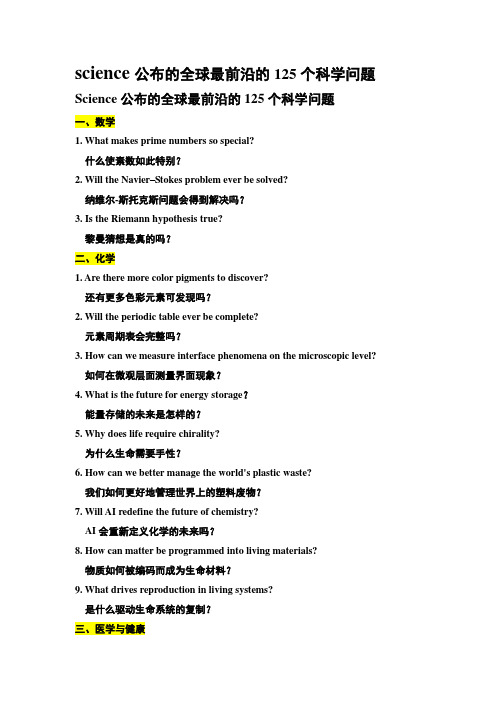
science公布的全球最前沿的125个科学问题Science公布的全球最前沿的125个科学问题一、数学1. What makes prime numbers so special?什么使素数如此特别?2. Will the Navier–Stokes problem ever be solved?纳维尔-斯托克斯问题会得到解决吗?3. Is the Riemann hypothesis true?黎曼猜想是真的吗?二、化学1. Are there more color pigments to discover?还有更多色彩元素可发现吗?2. Will the periodic table ever be complete?元素周期表会完整吗?3. How can we measure interface phenomena on the microscopic level? 如何在微观层面测量界面现象?4. What is the future for energy storage?能量存储的未来是怎样的?5. Why does life require chirality?为什么生命需要手性?6. How can we better manage the world's plastic waste?我们如何更好地管理世界上的塑料废物?7. Will AI redefine the future of chemistry?AI会重新定义化学的未来吗?8. How can matter be programmed into living materials?物质如何被编码而成为生命材料?9. What drives reproduction in living systems?是什么驱动生命系统的复制?三、医学与健康1. Can we predict the next pandemic?我们可以预测下一次流行病吗?2. Will we ever find a cure for the common cold?我们会找到治疗感冒的方法吗?3. Can we design and manufacture medicines customized for individual people? 我们可以设计和制造出为个人定制的药物吗?4. Can a human tissue or organ be fully regenerated?人体组织或器官可以完全再生吗?5. How is immune homeostasis maintained and regulated?如何维持和调节免疫稳态?6.Is there a scientific basis to the Meridian System in traditional Chinese medicine?中医的经络系统有科学依据吗?7. How will the next generation of vaccines be made?下一代疫苗将如何生产?8. Can we ever overcome antibiotic resistance?我们能否克服抗生素耐药性?9. What is the etiology of autism?自闭症的病因是什么?10. What role does our microbiome play in health and disease?我们的微生物组在健康和疾病中扮演什么角色?11. Can xenotransplantation solve the shortage of donor organs?异种移植能否解决供体器官的短缺问题?四、生命科学1. What could help conservation of the oceans?什么可以帮助保护海洋?2. Can we stop ourselves from aging?我们可以阻止自己衰老吗?3. Why can only some cells become other cells?为什么只有一些细胞会变成其他细胞?4. Why are some genomes so big and others very small?为什么有些基因组非常大而另一些却很小?5. Will it be possible to cure all cancers?有可能治愈所有癌症吗?6. What genes make us uniquely human?哪些基因使我们人类与众不同?7. How do migratory animals know where they're going?迁徙动物如何知道它们要去哪里?8. How many species are there on Earth?地球上有多少物种?9. How do organisms evolve?有机体是如何进化的?10. Why did dinosaurs grow to be so big?为什么恐龙长得如此之大?11. Did ancient humans interbreed with other human-like ancestors? 远古人类是否曾与其他类人祖先杂交?12. Why do humans get so attached to dogs and cats?人类为什么会对猫狗如此着迷?13. Will the world's population keep growing indefinitely?世界人口会无限增长吗?14. Why do we stop growing?我们为什么会停止生长?15. Is de-extinction possible?能否复活灭绝生物?16. Can humans hibernate?人类可以冬眠吗?17. Where do human emotions originate?人类的情感源于何处?18. Will humans look physically different in the future?未来人类的外貌会有所不同吗?19. Why were there species explosions and mass extinction?为什么会发生物种大爆发和大灭绝?20. How might genome editing be used to cure disease?基因组编辑将如何用于治疗疾病?21. Can a cell be artificially synthesized?可以人工合成细胞吗?22. How are biomolecules organized in cells to function orderly and effectively? 细胞内的生物分子是如何组织从而有序有效发挥作用的?五、天文学1. How many dimensions are there in space?空间中有多少个维度?2. What is the shape of the universe?宇宙的形状是怎样的?3. Where did the big bang start?大爆炸从何处开始?4. Why don't the orbits of planets decay and cause them to crash into each other? 为什么行星的轨道不衰减并导致它们相互碰撞?5. When will the universe die? Will it continue to expand?宇宙何时消亡?它会继续膨胀吗?6. Is it possible to live permanently on another planet?我们有可能在另一个星球上长期居住吗?7. Why do black holes exist?为什么存在黑洞?8. What is the universe made of?宇宙是由什么构成的?9. Are we alone in the universe?我们是宇宙中唯一的生命体吗?10. What is the origin of cosmic rays?宇宙射线的起源是什么?11.What is the origin of mass?物质的起源是什么?12. What is the smallest scale of space-time?时空的最小尺度是是多少?13. Is water necessary for all life in the universe, or just on Earth?水是宇宙中所有生命所必需的么,还是仅对地球生命?14. What is preventing humans from carrying out deep-space exploration? 是什么阻止了人类进行深空探测?15. Is Einstein's general theory of relativity correct?爱因斯坦的广义相对论是正确的吗?16. How are pulsars formed?脉冲星是如何形成的?17. Is our Milky Way Galaxy special?我们的银河系特别吗?18. What is the volume, composition, and significance of the deep biosphere? 深层生物圈的规模、组成和意义是什么?19. Will humans one day have to leave the planet (or die trying)?人类有一天会不得不离开地球吗(还是会在尝试中死去)?20. Where do the heavy elements in the universe come from?宇宙中的重元素来自何处?21. Is it possible to understand the structure of compact stars and matter? 有可能了解致密恒星和物质的结构吗?22. What is the origin of the high-energy cosmic neutrinos?高能宇宙中微子的起源是什么?23. What is gravity?什么是重力?六、物理学1. Is there a diffraction limit?有衍射极限吗?2. What is the microscopic mechanism for high-temperature superconductivity?高温超导的微观机理是什么?3. What are the limits of heat transfer in matter?物质传热的极限是什么?4. What are the fundamental principles of collective motion?集体运动的基本原理是什么?5. What are the smallest building blocks of matter?什么是物质的最小组成部分?6. Will we ever travel at the speed of light?我们会以光速行驶吗?7. What is quantum uncertainty and why is it important?什么是量子不确定性,为什么它很重要?8. Will there ever be a "theory of everything"?会有“万有理论”吗?9. Why does time seem to flow in only one direction?为什么时间似乎只朝一个方向流动?10. What is dark matter?什么是暗物质?11. Can we make a real, human-size invisibility cloak?我们可以制作出真人大小的隐形斗篷吗?12.Are there any particles that behave oppositely to the properties or states of photons?是否存在与光子性质或状态相反的粒子?13. Will the Bose-Einstein condensate be widely used in the future?玻色-爱因斯坦冷凝体未来会被广泛使用吗?14. Can humans make intense lasers with incoherence comparable to sunlight? 人类能制造出与太阳光相似的非相干强激光吗?15. What is the maximum speed to which we can accelerate a particle?我们最多可以将粒子加速到多快?16.Is quantum many-body entanglement more fundamental than quantum fields?量子多体纠缠比量子场更基本吗?17. What is the optimum hardware for quantum computers?量子计算机的最佳硬件是什么?18. Can we accurately simulate the macro- and microworld?我们可以精确模拟宏观和微观世界吗?七、信息科学1. Is there an upper limit to computer processing speed?计算机处理速度是否有上限?2. Can AI replace a doctor?AI可以代替医生吗?3. Can topological quantum computing be realized?拓扑量子计算可以实现吗?4. Can DNA act as an information storage medium?DNA可以用作信息存储介质吗?八、工程与材料科学1. What is the ultimate statistical invariances of turbulence?湍流的最终统计不变性是什么?2. How can we break the current limit of energy conversion efficiencies?我们如何突破当前的能量转换效率极限?3. How can we develop manufacturing systems on Mars?我们如何在火星上开发制造系统?4. Is a future of only self-driving cars realistic?纯无人驾驶汽车的未来是否现实?九、神经科学1. What are the coding principles embedded in neuronal spike trains?神经元放电序列的编码准则是什么?2. Where does consciousness lie?意识存在于何处?3.Can human memory be stored, manipulated, and transplanted digitally?能否数字化地存储、操控和移植人类记忆?4. Why do we need sleep?为什么我们需要睡眠?5. What is addiction and how does it work?什么是成瘾?6. Why do we fall in love?为什么我们会坠入爱河?7. How did speech evolve and what parts of the brain control it?言语如何演变形成,大脑的哪些部分对其进行控制?8. How smart are nonhuman animals?除人类以外的其他动物有多聪明?9. Why are most people right-handed?为什么大多数人都是右撇子?10. Can we cure neurodegenerative diseases?我们可以治愈神经退行性疾病吗?11. Is it possible to predict the future?有可能预知未来吗?12. Can we more effectively diagnose and treat complex mental disorders?精神障碍能否有效诊断和治疗?十、生态学1. Can we stop global climate change?我们可以阻止全球气候变化吗?2. Where do we put all the excess carbon dioxide?我们能把过量的二氧化碳存到何处?3. What creates the Earth's magnetic field (and why does it move)?是什么创造了地球的磁场(为什么它会移动)?4.Will we be able to predict catastrophic weather events (tsunami, hurricanes, earthquakes) more accurately?我们是否能够更准确地预测灾害性事件(海啸、飓风、地震)?5. What happens if all the ice on the planet melts?如果地球上所有的冰融化会怎样?6. Can we create an environmentally friendly replacement for plastics?我们可以创造一种环保的塑料替代品吗?7. Can we achieve a situation where essentially every material can be recycled and reused?几乎所有材料都可以回收再利用是否可以实现?8. Will we soon see the end of monocultures like wheat, maize, rice, and soy?我们会很快看到小麦、玉米、大米和大豆等单一作物的终结吗?十一、能源科学1. Could we live in a fossil-fuel-free world?我们可以生活在一个去化石燃料的世界中吗?2. What is the future of hydrogen energy?氢能的未来是怎样的?3. Will cold fusion ever be possible?冷聚变有可能实现吗?十二、人工智能1. Will injectable, disease-fighting nanobots ever be a reality?可注射的抗病纳米机器人会成为现实吗?2. Will it be possible to create sentient robots?是否有可能创建有感知力的机器人?3. Is there a limit to human intelligence?人类智力是否有极限?4. Will artificial intelligence replace humans?人工智能会取代人类吗?5. How does group intelligence emerge?群体智能是如何出现的?6. Can robots or AIs have human creativity?机器人或AI 可以具有人类创造力吗?7.Can quantum artificial intelligence imitate the human brain?量子人工智能可以模仿人脑吗?8. Could we integrate with computers to form a human-machine hybrid species? 我们可以和计算机结合以形成人机混合物种吗?。

Science杂志提出的125个重要科学问题1. 宇宙是由什么构成?2. 意识的生物学基础是什么?3. 为什么人类基因会如此之少?4. 遗传变异与人类健康的相关程度如何?5. 物理定律能否统一?6. 人类寿命到底可以延长多久?7. 是什么控制着器官再生?8. 皮肤细胞如何成为神经细胞?9. 单个体细胞怎样成为整株植物?10. 地球内部如何运行?11. 地球人类在宇宙中是否独一无二?12. 地球生命在何处产生、如何产生?(进化论的发展)13. 什么决定了物种的多样性?14. 什么基因的改变造就了独特的人类?15. 记忆如何存储和恢复?16. 人类合作行为如何发展?17. 怎样从海量生物数据中产生大的可视图片?18. 化学自组织的发展程度如何?19. 什么是传统计算的极限?20. 我们能否有选择地切断某些免疫反应?21. 量子不确定性和非局部性背后是否有更深刻的原理?22. 能否研制出有效的HTV疫苗?(一定可以获得诺贝尔奖)23. 温室效应会使地球温度达到多高?(全球变化的内容)24. 什么时间用什么能源可以替代石油?(能源危机的内容)25. 地球到底能负担多少人口?(人口论与资源环境的内容)26. 宇宙是否唯一?27. 是什么驱动宇宙膨胀?28. 第一颗恒星与星系何时产生、怎样产生?29. 超高能宇宙射线来自何处?30. 是什么给类星体提供动力?31. 黑洞的本质是什么?32. 正物质为何多于反物质?33. 质子会衰减吗?34. 重力的本质是什么?35. 时间为何不同于其他维度?36. 是否存在比夸克更小的基本粒子?37. 中微子是其自己的反粒子吗?38. 是否有解释所有相关电子系统的统一理论?39. 人类能够制造最强的激光吗?40. 能否制造完美的光学透镜?41. 是否可能制造出室温下的磁性半导体?42. 什么是高温超导性之后的成对机制?43. 能否发展关于湍流动力学和颗粒材料运动学的综合理论?44. 是否存在稳定的高原子量元素?45. 固体中是否有超流动性?如果有,如何解释?46. 水的结构如何?47. 玻璃态物质的本质是什么?48. 是否存在合理化学合成的极限?49. 光电电池的最终效率如何?50. 核聚变将最终成为未来的能源吗?51. 驱动太阳磁周期的原因是什么?52. 行星怎样形成?53. 是什么引发了冰期?(气候变化的内容)54. 使地球磁场逆转的原因是什么?(古地理内容和地球内部探测的内容)55. 是否存在有助于预报的地震先兆?(地球内部深度探测计划的发展)56. 太阳系的其他星球上现在和过去是否存在生命?57. 自然界中手性原则的起源是什么?58. 能否预测蛋白质折叠?59. 人体中的蛋白质有多少存在方式?60. 蛋白质如何发现其作用对象?61. 细胞死亡有多少种形式?62. 是什么保持了细胞内的通行顺畅?63. 为什么细胞的成分可以独立于DNA而自行复制?64. 基因组中功能不同于RNA的角色是什么?65. 基因组中端粒和丝粒的作用是什么?66. 为什么一些基因组很大,另一些又相当紧凑?67. 基因组中的“垃圾”(“junk”)有何作用?68. 新技术能使RNA测序的成本降低多少?69. 器官核整个有机体如何了解停止生长的时间?70. 除了继承突变,基因组如何改变?71. 在胚胎期,不对称现象是如何确定的?72. 翼、鳍核面孔如何发育进化?73. 是什么引发了青春期?74. 干细胞是否位于所有肿瘤的中心?75. 肿瘤更容易通过免疫进行控制吗?76. 肿瘤的控制比治愈是否更容易?77. 炎症是所有慢性疾病的主要原因吗?78. 疯牛病会怎样发展?79. 脊椎动物在多大程度上依赖先天免疫系统来抵抗传染病?80. 对抗原而言,免疫记忆需要延长暴露吗?81. 为什么孕妇的免疫系统不拒绝其胎儿?82. 什么与有机体的生物钟同步?83. 迁徙生物怎样发现其迁移路线?84. 为什么要睡眠?85. 人类为什么会做梦?86. 语言学习为什么存在临界期?87. 信息素影响人类行为吗?88. 一般麻醉剂如何发挥作用?89. 导致精神分裂症的原因是什么?90. 引发孤独症的原因是什么?91. 阿兹海默症患者的生命能够延续多久?92. 致瘾的生物学基础是什么?93. 大脑如何建立道德观念?94. 通过计算机进行学习的极限是什么?95. 又多少个性源于遗传?96. 性别倾向的生物学根源是什么?97. 生命树是生命之间系统关系最好的表达方式吗?98. 地球上又多少物种?99. 什么是物种?100. 横向转移为什么会发生在众多的物种中以及如何发生? 101. 谁是世界的共同祖先?102. 植物的花朵如何进化?103. 植物怎样制造细胞壁?104. 如何控制植物生长?105. 为什么所有的植物不能免疫一切疾病?106. 外界压力环境下,植物的变异基础是什么?107. 是什么引起物质消失?108. 能否避免物种消亡?109. 一些恐龙为什么如此庞大?110. 生态系统对全球变暖的反应如何?111. 至今共有多少人种,他们之间有何关联?112. 是什么提升了现代人类的行为?113. 什么是人类文化的根源?114. 语言和音乐演化的根源是什么?115. 什么是人种,人种如何进化?116. 为什么一些国家向前发展,而有些国家的发展停滞? 117. 政府高额赤字对国家利益和经济增长速度有什么影响? 118. 政治与经济自有密切相关吗?119. 为什么改变撒哈拉地区贫困状态的努力几乎全部失败?120. 有没有简单的方法确定椭圆曲线是否存在无穷多解?121. 霍奇闭链是代数闭链的和吗?122. 数学家将会最终给出Navier-Stokes方程的解吗?123. 庞加莱实验能否确定4维空间的球?124. 黎曼zeta函数的零解都有a+bi形式吗?125. 对粒子物理标准模型的研究是否会停止在量子Yang-Mills理论上?。
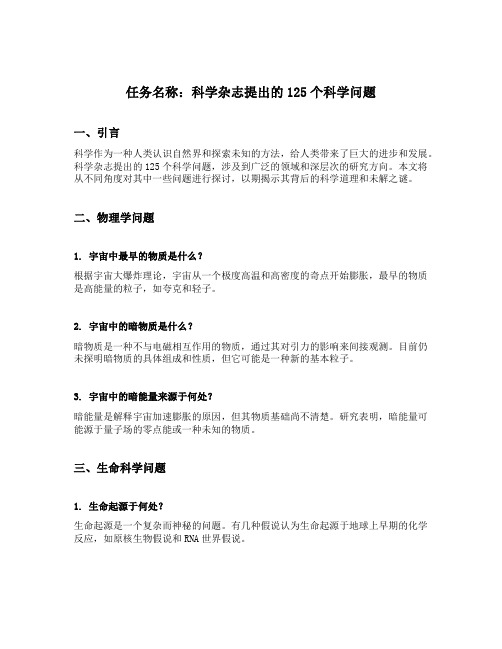
任务名称:科学杂志提出的125个科学问题一、引言科学作为一种人类认识自然界和探索未知的方法,给人类带来了巨大的进步和发展。
科学杂志提出的125个科学问题,涉及到广泛的领域和深层次的研究方向。
本文将从不同角度对其中一些问题进行探讨,以期揭示其背后的科学道理和未解之谜。
二、物理学问题1. 宇宙中最早的物质是什么?根据宇宙大爆炸理论,宇宙从一个极度高温和高密度的奇点开始膨胀,最早的物质是高能量的粒子,如夸克和轻子。
2. 宇宙中的暗物质是什么?暗物质是一种不与电磁相互作用的物质,通过其对引力的影响来间接观测。
目前仍未探明暗物质的具体组成和性质,但它可能是一种新的基本粒子。
3. 宇宙中的暗能量来源于何处?暗能量是解释宇宙加速膨胀的原因,但其物质基础尚不清楚。
研究表明,暗能量可能源于量子场的零点能或一种未知的物质。
三、生命科学问题1. 生命起源于何处?生命起源是一个复杂而神秘的问题。
有几种假说认为生命起源于地球上早期的化学反应,如原核生物假说和RNA世界假说。
2. DNA中的遗传密码如何演化而来?DNA的遗传密码决定了生物的遗传信息,但它是如何演化而来的仍然不清楚。
可能涉及到突变、自然选择和基因重组等机制。
3. 人类如何理解脑部的工作原理?人类脑部是一个复杂的网络,如何理解其工作原理一直是神经科学家的挑战。
通过神经影像技术和计算模拟等方法,我们正在逐步揭示脑部的奥秘。
4. 基因编辑技术如何应用于人类?基因编辑技术如CRISPR-Cas9已经实现了对基因组的精确编辑,为医学和农业领域带来了革命性变革。
但在应用于人类前,我们需要深入研究其安全性和道德问题。
四、地球科学问题1. 地球内部的热量如何产生?地球内部的热量主要来自于地球的放射性衰变和地球形成时的聚合热。
这些热量驱动了地球的板块运动、火山喷发和地震活动。
2. 地球气候变化的主要驱动因素是什么?除了人类活动引起的气候变化,地球气候变化的主要驱动因素还包括太阳辐射、大气环流、海洋循环和地球的轨道变化等。

科学125个前沿问题解读科学一直是人类探索未知、追求真理的利器,而科学前沿问题更是引领着人类对于世界的认识不断向前迈进。
在众多前沿问题中,有一些问题引起了广泛的关注和讨论,这些问题涉及到物理、化学、生物、天文等多个领域,对于我们理解世界和未来的发展具有重要意义。
在本文中,我们将围绕着科学125个前沿问题展开探讨,力求从浅入深地展示这些问题的研究现状和价值。
1. 宇宙膨胀速度为何加速?宇宙膨胀速度加速的问题被誉为宇宙学之谜,其背后牵扯着暗能量、引力波等多个领域的研究。
目前,科学家们提出了多种假说,包括暗能量、修正引力等,但仍未有定论。
深入研究宇宙膨胀速度加速的机制,对于我们理解宇宙的结构和演化具有重要意义。
2. 量子重力是怎样的?量子力学和广义相对论是当今物理学的两大支柱理论,然而在特殊条件下,这两个理论却存在矛盾。
量子重力理论的建立将为我们探索高能物理、黑洞和宇宙起源等提供重要线索,因此成为物理学研究的前沿课题。
3. DNA存储是未来的趋势吗?随着信息量的急剧增长,传统存储介质正面临着容量和稳定性等问题。
而以DNA作为存储介质的研究逐渐走入人们的视野,其高密度、长期稳定等特点使其成为未来存储的潜在选择。
对于DNA存储技术的研究,将会对未来信息技术的发展产生重要影响。
4. 人工智能的发展前景如何?随着深度学习、神经网络等技术的不断突破,人工智能正以前所未有的速度发展。
从智能机器人到智能医疗,人工智能将会对社会生活的方方面面产生深远影响。
人工智能的发展也带来了伦理、社会等诸多问题,需要我们认真思考和应对。
5. 如何解决气候变化问题?气候变化是当今世界面临的重大问题之一,其给地球环境和人类社会带来了极大的挑战。
科学家们正在研究气候系统的变化规律、减排技术、碳循环机制等,希望能找到有效的解决办法,减缓气候变化对地球的影响。
6. 生物多样性保护如何进行?生物多样性的减少对生态系统的稳定性和人类的生存都带来了不利影响。

SCIENCE公布的125个科学前沿问题SCIENCE公布的125个科学前沿问题程序员之家m... 05-14 21:59 大在庆祝SCIENCE创刊125周年之际,该刊杂志社公布了125个最具挑战性的科学问题。
在今后1/4个世纪的时间里,人们将致力于研究解决这些问题。
这125个问题如下(前25个被认为是最重要的问题):1宇宙由什么构成?2意识的生物学基础是什么?3为什么人类基因会如此之少?4遗传变异与人类健康的相关程度如何?5物理定律能否统一?6人类寿命到底可以延长多久?7是什么控制着器官再生?8皮肤细胞如何成为神经细胞?9单个体细胞怎样成为整株植物?10地球内部如何运行?11地球人类在宇宙中是否独一无二?12地球生命在何处产生、如何产生?13什么决定了物种的多样性?14什么基因的改变造就了独特的人类?15记忆如何存储和恢复?16人类合作行为如何发展?17怎样从海量生物数据中产生大的可视图片?18化学自组织的发展程度如何?19什么是传统计算的极限?20我们能否有选择地切断某些免疫反应?21量子不确定性和非局部性背后是否有更深刻的原理?22能否研制出有效的HIV疫苗?23温室效应会使地球温度达到多高?24什么时间用什么能源可以替代石油?25地球到底能负担多少人口?26宇宙是否唯一?27是什么驱动宇宙膨胀?28第一颗恒星与星系何时产生、怎样产生?29超高能宇宙射线来自何处?30是什么给类星体提供动力?31黑洞的本质是什么?32正物质为何多于反物质?33质子会衰减吗?34重力的本质是什么?35时间为何不同于其他维度?36是否存在比夸克更小的基本粒子?37中微子是其自己的反粒子吗?38是否有解释所有相关电子系统的统一理论?39人类能够制造最强的激光吗?40能否制造完美的光学透镜?41是否可能制造出室温下的磁性半导体?42什么是高温超导性之后的成对机制?43能否发展关于湍流动力学和颗粒材料运动学的综合理论? 44是否存在稳定的高原子量元素?45固体中是否有超流动性?如果有,如何解释?46水的结构如何?47玻璃态物质的本质是什么?48是否存在合理化学合成的极限?49光电电池的最终效率如何?50核聚变将最终成为未来的能源吗?51驱动太阳磁周期的原因是什么?52行星怎样形成?53是什么引发了冰期?54使地球磁场逆转的原因是什么?55是否存在有助于预报的地震先兆?56太阳系的其他星球上现在和过去是否存在生命?57自然界中手性原则的起源是什么?58能否预测蛋白质折叠?59人体中的蛋白质有多少存在方式?60蛋白质如何发现其作用对象?61细胞死亡有多少种形式?62是什么保持了细胞内的通行顺畅?63为什么细胞的成分可以独立于DNA而自行复制?64基因组中功能不同于RNA的角色是什么?65基因组中端粒和丝粒的作用是什么?66为什么一些基因组很大,另一些又相当紧凑?67基因组中的“垃圾”(“junk”)有何作用?68新技术能使DNA测序的成本降低多少?69器官和整个有机体如何了解停止生长的时间?70除了继承突变,基因组如何改变?71在胚胎期,不对称现象是如何确定的?72翼、鳍和面孔如何发育进化?73是什么引发了青春期?74干细胞是否位于所有肿瘤的中心?75肿瘤更容易通过免疫进行控制吗?76肿瘤的控制比治愈是否更容易?77炎症是所有慢性疾病的主要原因吗?78疯牛病会怎样发展?79脊椎动物在多大程度上依赖先天免疫系统来抵抗传染病? 80对抗原而言,免疫记忆需要延长暴露吗?81为什么孕妇的免疫系统不拒绝其胎儿?82什么与有机体的生物钟同步?83迁徙生物怎样发现其迁移路线?84为什么要睡眠?85人类为什么会做梦?86语言学习为什么存在临界期?87信息素影响人类行为吗?88一般麻醉剂如何发挥作用?89导致精神分裂症的原因是什么?90引发孤独症的原因是什么?91阿兹海默症患者的生命能够延续多久?92致瘾的生物学基础是什么?93大脑如何建立道德观念?94通过计算机进行学习的极限是什么?95有多少个性源于遗传?96性别倾向的生物学根源是什么?97生命树是生命之间系统关系最好的表达方式吗?98地球上有多少物种? 99什么是物种?100横向转移为什么会发生在众多的物种中以及如何发生? 101谁是世界的共同祖先?102植物的花朵如何进化?103植物怎样制造细胞壁?104如何控制植物生长?105为什么所有的植物不能免疫一切疾病?106外界压力环境下,植物的变异基础是什么?107是什么引起物质消失?108能否避免物种消亡?109一些恐龙为什么如此庞大?110生态系统对全球变暖的反应如何?111至今共有多少人种,他们之间有何关联?112是什么提升了现代人类的行为?113什么是人类文化的根源?114语言和音乐演化的根源是什么?115什么是人种,人种如何进化?116为什么一些国家向前发展,而有些国家的发展停滞?117政府高额赤字对国家利益和经济增长速度有什么影响?118政治与经济自由密切相关吗?119为什么改变撒哈拉地区贫困状态的努力几乎全部失败?120有没有简单的方法确定椭圆曲线是否存在无穷多解?121霍奇闭链是代数闭链的和吗?122数学家将会最终给出Navier-Stokes方程的解吗?123庞加莱实验能否确定4维空间的球?124黎曼zeta函数的零解都有a+bi形式吗?125对粒子物理标准模型的研究是否会停止在量子Yahg-Mills理论上?。
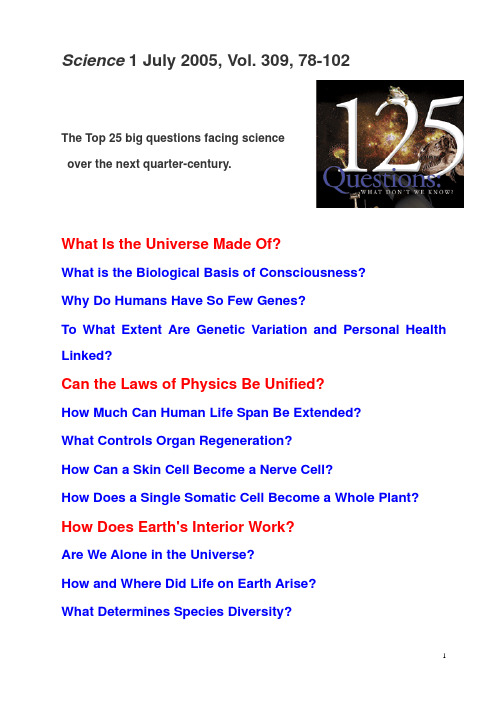
Science 1 July 2005, Vol. 309, 78-102The Top 25 big questions facing scienceover the next quarter-century.What Is the Universe Made Of?What is the Biological Basis of Consciousness?Why Do Humans Have So Few Genes?To What Extent Are Genetic Variation and Personal Health Linked?Can the Laws of Physics Be Unified?How Much Can Human Life Span Be Extended?What Controls Organ Regeneration?How Can a Skin Cell Become a Nerve Cell?How Does a Single Somatic Cell Become a Whole Plant? How Does Earth's Interior Work?Are We Alone in the Universe?How and Where Did Life on Earth Arise?What Determines Species Diversity?What Genetic Changes Made Us Uniquely Human?How Are Memories Stored and Retrieved?How Did Cooperative Behavior Evolve?How Will Big Pictures Emerge from a Sea of Biological Data? How Far Can We Push Chemical Self-Assembly? What Are the Limits of Conventional Computing?Can We Selectively Shut Off Immune Responses?Do Deeper Principles Underlie Quantum Uncertainty and Nonlocality?Is an Effective HIV Vaccine Feasible?How Hot Will the Greenhouse World Be?What Can Replace Cheap Oil -- and When?Will Malthus Continue to Be Wrong?So Much More to Know … Some of the following 100 questions will drive scientific inquiry for the next century; others may soon be answered.1. Is ours the only universe?A number of quantum theorists and cosmologists are trying to figure out whether our universe is part of a bigger "multiverse." But others suspect that thishard-to-test idea may be a question for philosophers.2. What drove cosmic inflation?In the first moments after the big bang, the universe blew up at an incredible rate. But what did the blowing? Measurements of the cosmic microwave background and other astrophysical observations are narrowing the possibilities.3. When and how did the first stars and galaxies form?The broad brush strokes are visible, but the fine details aren't. Data from satellites and ground-based telescopes may soon help pinpoint, among other particulars, when the first generation of stars burned off the hydrogen "fog" that filled the universe.4. Where do ultrahigh-energy cosmic rays come from?Above a certain energy, cosmic rays don't travel very far before being destroyed. So why are cosmic-ray hunters spotting such rays with no obvious source within our galaxy?5. What powers quasars?The mightiest energy fountains in the universe probably get their power from matter plunging into whirling supermassive black holes. But the details of what drives their jets remain anybody's guess.6. What is the nature of black holes?Relativistic mass crammed into a quantum-sized object? It's a recipe for disaster--and scientists are still trying to figure out the ingredients.7. Why is there more matter than antimatter?To a particle physicist, matter and antimatter are almost the same. Some subtle difference must explain why matter is common and antimatter rare.8. Does the proton decay?In a theory of everything, quarks (which make up protons) should somehow be convertible to leptons (such as electrons)--so catching a proton decaying into something else might reveal new laws of particle physics.9. What is the nature of gravity?It clashes with quantum theory. It doesn't fit in the Standard Model. Nobody has spotted the particle that is responsible for it. Newton's apple contained a whole can of worms.10. Why is time different from other dimensions?It took millennia for scientists to realize that time is a dimension, like the three spatial dimensions, and that time and space are inextricably linked. The equations make sense, but they don't satisfy those who ask why we perceive a "now" or why time seems to flow the way it does.11. Are there smaller building blocks than quarks?Atoms were "uncuttable." Then scientists discovered protons, neutrons, and other subatomic particles--which were, in turn, shown to be made up of quarks and gluons. Is there something more fundamental still?12. Are neutrinos their own antiparticles?Nobody knows this basic fact about neutrinos, although a number of underground experiments are under way. Answering this question may be a crucial step to understanding the origin of matter in the universe.13. Is there a unified theory explaining all correlated electron systems?High-temperature superconductors and materials with giant and colossal magnetoresistance are all governed by the collective rather than individual behavior of electrons. There is currently no common framework for understanding them.14. What is the most powerful laser researchers can build? Theorists say an intense enough laser field would rip photons intoelectron-positron pairs, dousing the beam. But no one knows whether it's possible to reach that point.15. Can researchers make a perfect optical lens?They've done it with microwaves but never with visible light.16. Is it possible to create magnetic semiconductors that work at room temperature?Such devices have been demonstrated at low temperatures but not yet in a range warm enough for spintronics applications.17. What is the pairing mechanism behindhigh-temperature superconductivity?Electrons in superconductors surf together in pairs. After 2 decades of intense study, no one knows what holds them together in the complex, high-temperature materials.18. Can we develop a general theory of the dynamics of turbulent flows and the motion of granular materials?So far, such "nonequilibrium systems" defy the tool kit of statistical mechanics, and the failure leaves a gaping hole in physics.19. Are there stable high-atomic-number elements?A superheavy element with 184 neutrons and 114 protons should be relatively stable, if physicists can create it.20. Is superfluidity possible in a solid? If so, how?Despite hints in solid helium, nobody is sure whether a crystalline material can flow without resistance. If new types of experiments show that such outlandish behavior is possible, theorists would have to explain how.21. What is the structure of water?Researchers continue to tussle over how many bonds each H2O molecule makes with its nearest neighbors.22. What is the nature of the glassy state?Molecules in a glass are arranged much like those in liquids but are more tightly packed. Where and why does liquid end and glass begin?23. Are there limits to rational chemical synthesis?The larger synthetic molecules get, the harder it is to control their shapes and make enough copies of them to be useful. Chemists will need new tools to keep their creations growing.24. What is the ultimate efficiency of photovoltaic cells? Conventional solar cells top out at converting 32% of the energy in sunlight to electricity. Can researchers break through the barrier?25. Will fusion always be the energy source of the future? It's been 35 years away for about 50 years, and unless the international community gets its act together, it'll be 35 years away for many decades to come.26. What drives the solar magnetic cycle?Scientists believe differing rates of rotation from place to place on the sun underlie its 22-year sunspot cycle. They just can't make it work in their simulations. Either a detail is askew, or it's back to the drawing board.27. How do planets form?How bits of dust and ice and gobs of gas came together to form the planets without the sun devouring them all is still unclear. Planetary systems around other stars should provide clues.28. What causes ice ages?Something about the way the planet tilts, wobbles, and careens around the sun presumably brings on ice ages every 100,000 years or so, but reams of climate records haven't explained exactly how.29. What causes reversals in Earth's magnetic field? Computer models and laboratory experiments are generating new data on how Earth's magnetic poles might flip-flop. The trick will be matching simulations to enough aspects of the magnetic field beyond the inaccessible core to build a convincing case.30. Are there earthquake precursors that can lead to useful predictions?Prospects for finding signs of an imminent quake have been waning since the 1970s. Understanding faults will progress, but routine prediction would require an as-yet-unimagined breakthrough.31. Is there--or was there--life elsewhere in the solar system?The search for life--past or present--on other planetary bodies now drivesNASA's planetary exploration program, which focuses on Mars, where water abounded when life might have first arisen.32. What is the origin of homochirality in nature?Most biomolecules can be synthesized in mirror-image shapes. Yet in organisms, amino acids are always left-handed, and sugars are always right-handed. The origins of this preference remain a mystery.33. Can we predict how proteins will fold?Out of a near infinitude of possible ways to fold, a protein picks one in just tens of microseconds. The same task takes 30 years of computer time.34. How many proteins are there in humans?It has been hard enough counting genes. Proteins can be spliced in different ways and decorated with numerous functional groups, all of which makes counting their numbers impossible for now.35. How do proteins find their partners?Protein-protein interactions are at the heart of life. To understand how partners come together in precise orientations in seconds, researchers need to know more about the cell's biochemistry and structural organization.36. How many forms of cell death are there?In the 1970s, apoptosis was finally recognized as distinct from necrosis. Some biologists now argue that the cell death story is even more complicated. Identifying new ways cells die could lead to better treatments for cancer and degenerative diseases.37. What keeps intracellular traffic running smoothly?Membranes inside cells transport key nutrients around, and through, various cell compartments without sticking to each other or losing their way. Insights into how membranes stay on track could help conquer diseases, such as cystic fibrosis.38. What enables cellular components to copy themselves independent of DNA? Centrosomes, which help pull apart paired chromosomes, and other organelles replicate on their own time, without DNA's guidance. This independence still defies explanation.39. What roles do different forms of RNA play in genome function?RNA is turning out to play a dizzying assortment of roles, from potentially passing genetic information to offspring to muting gene expression. Scientists are scrambling to decipher this versatile molecule.40. What role do telomeres and centromeres play in genome function?These chromosome features will remain mysteries until new technologies can sequence them.41. Why are some genomes really big and others quite compact?The puffer fish genome is 400 million bases; one lungfish's is 133 billion bases long. Repetitive and duplicated DNA don't explain why this and other size differences exist.42. What is all that "junk" doing in our genomes?DNA between genes is proving important for genome function and the evolution of new species. Comparative sequencing, microarray studies, and lab work are helping genomicists find a multitude of genetic gems amid the junk.43. How much will new technologies lower the cost of sequencing?New tools and conceptual breakthroughs are driving the cost of DNA sequencing down by orders of magnitude. The reductions are enabling research from personalized medicine to evolutionary biology to thrive.44. How do organs and whole organisms know when to stop growing?A person's right and left legs almost always end up the same length, and the hearts of mice and elephants each fit the proper rib cage. How genes set limits on cell size and number continues to mystify.45. How can genome changes other than mutations be inherited?Researchers are finding ever more examples of this process, called epigenetics, but they can't explain what causes and preserves the changes.46. How is asymmetry determined in the embryo?Whirling cilia help an embryo tell its left from its right, but scientists are stilllooking for the first factors that give a relatively uniform ball of cells a head, tail, front, and back.47. How do limbs, fins, and faces develop and evolve?The genes that determine the length of a nose or the breadth of a wing are subject to natural and sexual selection. Understanding how selection works could lead to new ideas about the mechanics of evolution with respect to development.48. What triggers puberty?Nutrition--including that received in utero--seems to help set this mysterious biological clock, but no one knows exactly what forces childhood to end.49. Are stem cells at the heart of all cancers?The most aggressive cancer cells look a lot like stem cells. If cancers are caused by stem cells gone awry, studies of a cell's "stemness" may lead to tools that could catch tumors sooner and destroy them more effectively.50. Is cancer susceptible to immune control?Although our immune responses can suppress tumor growth, tumor cells can combat those responses with counter-measures. This defense can stymie researchers hoping to develop immune therapies against cancer.51. Can cancers be controlled rather than cured?Drugs that cut off a tumor's fuel supplies--say, by stopping blood-vesselgrowth--can safely check or even reverse tumor growth. But how long the drugs remain effective is still unknown.52. Is inflammation a major factor in all chronic diseases?It's a driver of arthritis, but cancer and heart disease? More and more, the answer seems to be yes, and the question remains why and how.53. How do prion diseases work?Even if one accepts that prions are just misfolded proteins, many mysteries remain. How can they go from the gut to the brain, and how do they kill cells once there, for example.54. How much do vertebrates depend on the innate immune system to fight infection?This system predates the vertebrate adaptive immune response. Its relative importance is unclear, but immunologists are working to find out.55. Does immunologic memory require chronic exposure to antigens?Yes, say a few prominent thinkers, but experiments with mice now challenge the theory. Putting the debate to rest would require proving that something is not there, so the question likely will not go away.56. Why doesn't a pregnant woman reject her fetus?Recent evidence suggests that the mother's immune system doesn't "realize" that the fetus is foreign even though it gets half its genes from the father. Yet just as Nobelist Peter Medawar said when he first raised this question in 1952, "the verdict has yet to be returned."57. What synchronizes an organism's circadian clocks?Circadian clock genes have popped up in all types of creatures and in many parts of the body. Now the challenge is figuring out how all the gears fit together and what keeps the clocks set to the same time.58. How do migrating organisms find their way?Birds, butterflies, and whales make annual journeys of thousands of kilometers. They rely on cues such as stars and magnetic fields, but the details remain unclear.59. Why do we sleep?A sound slumber may refresh muscles and organs or keep animals safe from dangers lurking in the dark. But the real secret of sleep probably resides in the brain, which is anything but still while we're snoring away.60. Why do we dream?Freud thought dreaming provides an outlet for our unconscious desires. Now, neuroscientists suspect that brain activity during REM sleep--when dreams occur--is crucial for learning. Is the experience of dreaming just a side effect? 61. Why are there critical periods for language learning?Monitoring brain activity in young children--including infants--may shed light on why children pick up languages with ease while adults often struggle to learn train station basics in a foreign tongue.62. Do pheromones influence human behavior?Many animals use airborne chemicals to communicate, particularly when mating. Controversial studies have hinted that humans too use pheromones. Identifying them will be key to assessing their sway on our social lives.63. How do general anesthetics work?Scientists are chipping away at the drugs' effects on individual neurons, but understanding how they render us unconscious will be a tougher nut to crack. 64. What causes schizophrenia?Researchers are trying to track down genes involved in this disorder. Clues may also come from research on traits schizophrenics share with normal people.65. What causes autism?Many genes probably contribute to this baffling disorder, as well as unknown environmental factors. A biomarker for early diagnosis would help improve existing therapy, but a cure is a distant hope.66. To what extent can we stave off Alzheimer's?A 5- to 10-year delay in this late-onset disease would improve old age for millions. Researchers are determining whether treatments with hormones or antioxidants, or mental and physical exercise, will help.67. What is the biological basis of addiction?Addiction involves the disruption of the brain's reward circuitry. But personality traits such as impulsivity and sensation-seeking also play a part in this complex behavior.68. Is morality hardwired into the brain?That question has long puzzled philosophers; now some neuroscientists think brain imaging will reveal circuits involved in reasoning.69. What are the limits of learning by machines?Computers can already beat the world's best chess players, and they have a wealth of information on the Web to draw on. But abstract reasoning is still beyond any machine.70. How much of personality is genetic?Aspects of personality are influenced by genes; environment modifies the genetic effects. The relative contributions remain under debate.71. What is the biological root of sexual orientation?Much of the "environmental" contribution to homosexuality may occur before birth in the form of prenatal hormones, so answering this question will require more than just the hunt for "gay genes."72. Will there ever be a tree of life that systematists can agree on?Despite better morphological, molecular, and statistical methods, researchers' trees don't agree. Expect greater, but not complete, consensus.73. How many species are there on Earth?Count all the stars in the sky? Impossible. Count all the species on Earth? Ditto. But the biodiversity crisis demands that we try.74. What is a species?A "simple" concept that's been muddied by evolutionary data; a clear definition may be a long time in coming.75. Why does lateral transfer occur in so many species and how?Once considered rare, gene swapping, particularly among microbes, is proving quite common. But why and how genes are so mobile--and the effect onfitness--remains to be determined.76. Who was LUCA (the last universal common ancestor)?Ideas about the origin of the 1.5-billion-year-old "mother" of all complex organisms abound. The continued discovery of primitive microbes, along with comparative genomics, should help resolve life's deep past.77. How did flowers evolve?Darwin called this question an "abominable mystery." Flowers arose in the cycads and conifers, but the details of their evolution remain obscure.78. How do plants make cell walls?Cellulose and pectin walls surround cells, keeping water in and supporting tall trees. The biochemistry holds the secrets to turning its biomass into fuel.79. How is plant growth controlled?Redwoods grow to be hundreds of meters tall, Arctic willows barely 10 centimeters. Understanding the difference could lead to higher-yielding crops. 80. Why aren't all plants immune to all diseases?Plants can mount a general immune response, but they also maintain molecular snipers that take out specific pathogens. Plant pathologists are asking why different species, even closely related ones, have different sets of defenders. The answer could result in hardier crops.81. What is the basis of variation in stress tolerance in plants?We need crops that better withstand drought, cold, and other stresses. But there are so many genes involved, in complex interactions, that no one has yet figured out which ones work how.82. What caused mass extinctions?A huge impact did in the dinosaurs, but the search for other catastrophic triggers of extinction has had no luck so far. If more subtle or stealthy culprits are to blame, they will take considerably longer to find.83. Can we prevent extinction?Finding cost-effective and politically feasible ways to save many endangered species requires creative thinking.84. Why were some dinosaurs so large?Dinosaurs reached almost unimaginable sizes, some in less than 20 years. But how did the long-necked sauropods, for instance, eat enough to pack on up to 100 tons without denuding their world?85. How will ecosystems respond to global warming?To anticipate the effects of the intensifying greenhouse, climate modelers will have to focus on regional changes and ecologists on the right combination of environmental changes.86. How many kinds of humans coexisted in the recent past, and how did they relate?The new dwarf human species fossil from Indonesia suggests that at least four kinds of humans thrived in the past 100,000 years. Better dates and additional material will help confirm or revise this picture.87. What gave rise to modern human behavior?Did Homo sapiens acquire abstract thought, language, and art gradually or in a cultural "big bang," which in Europe occurred about 40,000 years ago? Data from Africa, where our species arose, may hold the key to the answer.88. What are the roots of human culture?No animal comes close to having humans' ability to build on previous discoveries and pass the improvements on. What determines those differences could help us understand how human culture evolved.89. What are the evolutionary roots of language and music?Neuroscientists exploring how we speak and make music are just beginning to find clues as to how these prized abilities arose.90. What are human races, and how did they develop?Anthropologists have long argued that race lacks biological reality. But our genetic makeup does vary with geographic origin and as such raises political and ethical as well as scientific questions.91. Why do some countries grow and others stagnate?From Norway to Nigeria, living standards across countries vary enormously, and they're not becoming more equal.92. What impact do large government deficits have on a country's interest rates and economic growth rate?The United States could provide a test case.93. Are political and economic freedom closely tied?China may provide one answer.94. Why has poverty increased and life expectancy declined in sub-Saharan Africa?Almost all efforts to reduce poverty in sub-Saharan Africa have failed. Figuring out what will work is crucial to alleviating massive human suffering.The following six mathematics questions are drawn from a list of seven outstanding problems selected by the Clay Mathematics Institute.95. Is there a simple test for determining whether an elliptic curve has an infinite number of rational solutions?Equations of the form y2 = x3ax b are powerful mathematical tools. The Birch and Swinnerton-Dyer conjecture tells how to determine how many solutions they have in the realm of rational numbers--information that could solve a host of problems, if the conjecture is true.96. Can a Hodge cycle be written as a sum of algebraic cycles?Two useful mathematical structures arose independently in geometry and in abstract algebra. The Hodge conjecture posits a surprising link between them, but the bridge remains to be built.97. Will mathematicians unleash the power of the Navier-Stokes equations?First written down in the 1840s, the equations hold the keys to understanding both smooth and turbulent flow. To harness them, though, theorists must find out exactly when they work and under what conditions they break down.98. Does Poincaré's test identify spheres in four-dimensional space?You can tie a string around a doughnut, but it will slide right off a sphere. The mathematical principle behind that observation can reliably spot every spherelike object in 3D space. Henri Poincaré conjectured that it should also work in the next dimension up, but no one has proved it yet.99. Do mathematically interesting zero-value solutions of the Riemann zeta function all have the form a bi?Don't sweat the details. Since the mid-19th century, the "Riemann hypothesis" has been the monster catfish in mathematicians' pond. If true, it will give them a wealth of information about the distribution of prime numbers and otherlong-standing mysteries.100. Does the Standard Model of particle physics rest on solid mathematical foundations?For almost 50 years, the model has rested on "quantumYang-Mills theory," which links the behavior of particles to structures found in geometry. The theory is breathtakingly elegant and useful--but no one has proved that it's sound.I was disappointed to see that music only got half a question: "What arethe evolutionary roots of language and music?"By lumping music in with language, you ignore the major differencebetween current scientific understandings of these two phenomena.With language, we know what it is and what it is for: communication. It'squite obvious what disadvantages a person suffers if they lack language ability. We do not know any of these things about music. We do notknow what it is, what it is for, or if it is for anything. Nor do weunderstand the relationship between language and music, althoughsome of the similarities are obvious. (Does music share some purposewith language? Is it a side-effect of some aspect of language ability?)The big question about music is not what its evolutionary roots are, butsimply "What is it?".The list of difficult questions was very interesting, but I was surprised to see that the following two items were not included:Does dark matter exist? How can it be found, and what is its mass within a given volume of space, say the Milky Way galaxy?Does dark energy exist? How can it be detected, and how much force does it exert? Is it pushing stars and galaxies away at ever increasing speeds assome are speculating?I am shocked by two aspects of your selection of 125 hard questions. The first is the sheer narrowness of vision shown by your selection process. Important hard questions do exist outside biology (72 questions) andphysics/mathematics (41 questions). You have ignored, almost completely, all the social sciences. It is important to understand that the social sciences study things, mainly human groups, far more complex than anything in physics. Their insights and results affect us just as much as those of any other science, and often more directly and intimately.The social science questions that you did produce are a poor selection. You give four questions about aspects of human societies :-1. Why do some countries grow and others stagnate?2. What impact do large government deficits have on a country's interestrates and economic growth rate?3. Are political and economic freedom closely tied?4. Why has poverty increased and life expectancy declined in sub-Saharan。

自然界中手性原则的起源是什么
这是2005年美国SCIENCE杂志社公布的125个科学前沿问题中第57个问题,根据刘泰祥用“系统相对论”研究方法创建的“一元二态物理”,简答如下:
自然界中手性原则起源于地球引力场和地磁场。
人们是在地表和近地空间中获得“手性原则”这个认识的。
在这个环境中,所有研究对象(物体)都处于地球场(引力场和地磁场,二者处于相互协变状态)之中,物体的表面场强都小于地球场强,因此都没有外场,物体的场域边界位于其临界场中。
根据系统相对论的最大作用原理,在地磁场的诱导下,物体的场函数发生协变,使物体场与地球场始终处于完全匹配状态(即二者之间耦合引力最强)。
换言之,近地空间中的所有物体,其场函数都已被地球场所协变,而不是它们自身所固有的本征场函数。
由于引力场具有不可屏蔽的性质,因此在近地空间中的一切实验,都是以地球场函数为观测背景,对被地球场所协变的物体场的一种观测。
这就是所谓“自然界中手性原则的起源”,当然这里所说的“自然界”是指近地空间。
由此可见,当把从近地空间实验中所获得的带有地球场函数烙印的经验和知识直接推广到近地空间之外区域时,我们就已经掉入了“手性原则”的陷阱之中,不觉
中物理学已经偏离了正确的发展道路。
这是导致当前基础物理理论纷乱现状的总根源。

《Science》震撼发布:2021新版世界最前沿的125个重大科学问题16年前《科学》杂志发布了《125个科学问题——我们有哪些未知》,为人类科学的发展指明了方向,促进了人类的文明与进步。
2021年4月《科学》杂志震撼发布了《125个科学问题——探索与发现》,这些问题是国际前沿、全球共需、科学发展、聚焦人类福祉和前瞻重大科学问题,对未来科技的发展具有强烈的指导意义。
2021新版125个科学问题如下:MathematicalSciences数学1.什么使素数如此特别?2.纳维尔-斯托克斯问题会得到解决吗?3.黎曼猜想是真的吗?Chemistry化学4.还有更多色彩元素可发现吗?5.元素周期表会完整吗?6.如何在微观层面测量界面现象?7.能量存储的未来是怎样的?8.为什么生命需要手性?9.我们如何更好地管理世界上的塑料废物?10.AI会重新定义化学的未来吗?11.物质如何被编码而成为生命材料?12.是什么驱动生命系统的复制?Medicine & Health医学与健康13.我们可以预测下一次流行病吗?14.我们会找到治疗感冒的方法吗?15.我们可以设计和制造出为个人定制的药物吗?16.人体组织或器官可以完全再生吗?17.如何维持和调节免疫稳态?18.中医的经络系统有科学依据吗?19.下一代疫苗将如何生产?20.我们能否克服抗生素耐药性?21.自闭症的病因是什么?22.我们的微生物组在健康和疾病中扮演什么角色?23.异种移植能否解决供体器官的短缺问题?Biology生命科学24.什么可以帮助保护海洋?25.我们可以阻止自己衰老吗?26.为什么只有一些细胞会变成其他细胞?27.为什么有些基因组非常大而另一些却很小?28.有可能治愈所有癌症吗?29.哪些基因使我们人类与众不同?30.迁徙动物如何知道它们要去哪里?31.地球上有多少物种?32.有机体是如何进化的?33.为什么恐龙长得如此之大?34.远古人类是否曾与其他类人祖先杂交?35.人类为什么会对猫狗如此着迷?36.世界人口会无限增长吗?37.我们为什么会停止生长?38.能否复活灭绝生物?39.人类可以冬眠吗?40.人类的情感源于何处?41.未来人类的外貌会有所不同吗?42.为什么会发生物种大爆发和大灭绝?43.基因组编辑将如何用于治疗疾病?44.可以人工合成细胞吗?45.细胞内的生物分子是如何组织从而有序有效发挥作用的?Astronomy天文学46.空间中有多少个维度?47.宇宙的形状是怎样的?48.大爆炸从何处开始?49.为什么行星的轨道不衰减并导致它们相互碰撞?50.宇宙何时消亡?它会继续膨胀吗?51.我们有可能在另一个星球上长期居住吗?52.为什么存在黑洞?53.宇宙是由什么构成的?54.我们是宇宙中唯一的生命体吗?55.宇宙射线的起源是什么?56.物质的起源是什么?57.时空的最小尺度是是多少?58.水是宇宙中所有生命所必需的么,还是仅对地球生命?59.是什么阻止了人类进行深空探测?60.爱因斯坦的广义相对论是正确的吗?61.脉冲星是如何形成的?62.我们的银河系特别吗?63.深层生物圈的规模、组成和意义是什么?64.人类有一天会不得不离开地球吗(还是会在尝试中死去)?65.宇宙中的重元素来自何处?66.有可能了解致密恒星和物质的结构吗?67.高能宇宙中微子的起源是什么?68.什么是重力?Physics物理学69.有衍射极限吗?70.高温超导的微观机理是什么?71.物质传热的极限是什么?72.集体运动的基本原理是什么?73.什么是物质的最小组成部分?74.我们会以光速行驶吗?75.什么是量子不确定性,为什么它很重要?76.会有“万有理论”吗?77.为什么时间似乎只朝一个方向流动?78.什么是暗物质?79.我们可以制作出真人大小的隐形斗篷吗?80.是否存在与光子性质或状态相反的粒子?81.玻色-爱因斯坦冷凝体未来会被广泛使用吗?82.人类能制造出与太阳光相似的非相干强激光吗?83.我们最多可以将粒子加速到多快?84.量子多体纠缠比量子场更基本吗?85.量子计算机的最佳硬件是什么?86.我们可以精确模拟宏观和微观世界吗?Information Science信息科学87.计算机处理速度是否有上限?88.AI可以代替医生吗?89.拓扑量子计算可以实现吗?90.DNA可以用作信息存储介质吗?Engineering & Material Science工程与材料科学91.湍流的最终统计不变性是什么?92.我们如何突破当前的能量转换效率极限?93.我们如何在火星上开发制造系统?94.纯无人驾驶汽车的未来是否现实?Neuroscience神经科学95.神经元放电序列的编码准则是什么?96.意识存在于何处?97.能否数字化地存储、操控和移植人类记忆?98.为什么我们需要睡眠?99.什么是成瘾?100.为什么我们会坠入爱河?101.言语如何演变形成,大脑的哪些部分对其进行控制?102.除人类以外的其他动物有多聪明?103.为什么大多数人都是右撇子?104.我们可以治愈神经退行性疾病吗?105.有可能预知未来吗?106.精神障碍能否有效诊断和治疗?Ecology生态学107.我们可以阻止全球气候变化吗?108.我们能把过量的二氧化碳存到何处?109.是什么创造了地球的磁场(为什么它会移动)?110.我们是否能够更准确地预测灾害性事件(海啸、飓风、地震)?111.如果地球上所有的冰融化会怎样?112.我们可以创造一种环保的塑料替代品吗?113.几乎所有材料都可以回收再利用是否可以实现?114.我们会很快看到小麦、玉米、大米和大豆等单一作物的终结吗?Energy Science能源科学115.我们可以生活在一个去化石燃料的世界中吗?116.氢能的未来是怎样的?117.冷聚变有可能实现吗?Artificial Intelligence人工智能118.可注射的抗病纳米机器人会成为现实吗?119.是否有可能创建有感知力的机器人?120.人类智力是否有极限?121.人工智能会取代人类吗?122.群体智能是如何出现的?123.机器人或 AI 可以具有人类创造力吗?124.量子人工智能可以模仿人脑吗?125.我们可以和计算机结合以形成人机混合物种吗?【参考文献】/collections/125-questions-exploration-and-discovery。
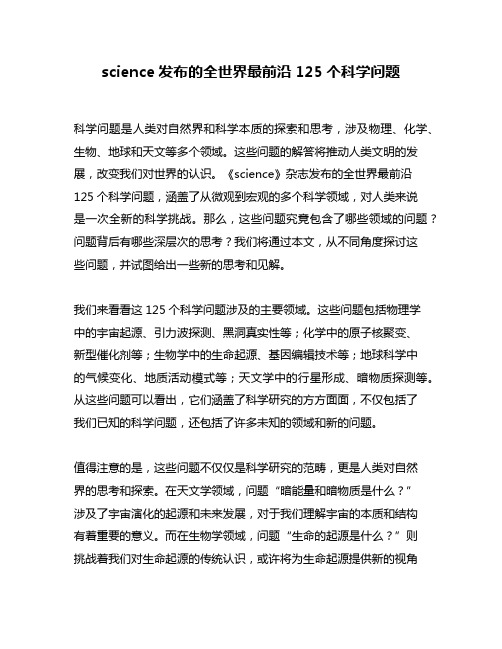
science发布的全世界最前沿125个科学问题科学问题是人类对自然界和科学本质的探索和思考,涉及物理、化学、生物、地球和天文等多个领域。
这些问题的解答将推动人类文明的发展,改变我们对世界的认识。
《science》杂志发布的全世界最前沿125个科学问题,涵盖了从微观到宏观的多个科学领域,对人类来说是一次全新的科学挑战。
那么,这些问题究竟包含了哪些领域的问题?问题背后有哪些深层次的思考?我们将通过本文,从不同角度探讨这些问题,并试图给出一些新的思考和见解。
我们来看看这125个科学问题涉及的主要领域。
这些问题包括物理学中的宇宙起源、引力波探测、黑洞真实性等;化学中的原子核聚变、新型催化剂等;生物学中的生命起源、基因编辑技术等;地球科学中的气候变化、地质活动模式等;天文学中的行星形成、暗物质探测等。
从这些问题可以看出,它们涵盖了科学研究的方方面面,不仅包括了我们已知的科学问题,还包括了许多未知的领域和新的问题。
值得注意的是,这些问题不仅仅是科学研究的范畴,更是人类对自然界的思考和探索。
在天文学领域,问题“暗能量和暗物质是什么?”涉及了宇宙演化的起源和未来发展,对于我们理解宇宙的本质和结构有着重要的意义。
而在生物学领域,问题“生命的起源是什么?”则挑战着我们对生命起源的传统认识,或许将为生命起源提供新的视角和理论。
这些看似深奥的问题实际上都是我们对自然界的向往和探索,也是人类对自身的思考和解答。
对于这些问题,科学家们已经做出了许多努力和探索,但依然有很多问题尚未得到彻底解答。
这背后可能是我们对自然界的认识还不够深刻,也可能是我们的研究方法和技术还不够先进。
然而,正是这些未解之谜,推动了科学研究的前进,激励着科学家们不断进行探索和实践。
正如艾萨克·牛顿所说:“如果我看得更远,是因为我站在巨人的肩膀上。
”我们可以看到,这125个科学问题就是科学家们站在巨人的肩膀上,向着更远的地方不断迈进的新起点。


科学一直是人类思考的焦点,而随着科学技术的不断发展,人们对许多重要科学问题的探讨也变得日益深刻。
在当今世界,有许多重要的科学问题需要解决,这些问题涉及到天文学、地球科学、生命科学、物理学、化学等多个领域。
下面将介绍科学领域中最为关键的25个问题。
一、宇宙学1. 宇宙膨胀问题:宇宙是如何膨胀的?宇宙的膨胀速度和膨胀的原因是什么?2. 暗物质和暗能量问题:暗物质和暗能量占据了宇宙中绝大部分的质量和能量,但它们的本质是什么?它们与普通物质和能量之间的关系是怎样的?3. 暗流体和暗辐射问题:暗物质和暗能量如何影响宇宙中的暗流体和暗辐射?这些暗物质和暗能量与我们所熟知的物质和能量之间的相互作用又是怎样的?二、地球科学4. 大气环境变化问题:地球大气层的化学成分和气候变化对地球生态系统有何影响?人类活动对大气环境变化产生了怎样的影响?5. 地壳运动和地震预测问题:地球内部的地壳运动和地震活动是如何发生的?能否准确地预测地震的发生时间和地点?6. 海洋资源开发和生态平衡问题:海洋资源的开发对海洋生态系统和生物多样性产生了哪些影响?如何在海洋资源开发和生态平衡之间找到平衡点?三、生命科学7. 生命起源和演化问题:生命是如何在地球上起源的?生命的演化过程是怎样的?8. 基因组学和基因编辑问题:基因组学和基因编辑技术对生命科学和医学领域的发展产生了怎样的影响?这些技术可能对人类社会产生哪些重大影响?9. 生物多样性保护和生态平衡问题:地球上生物多样性的保护是怎样的?保护生物多样性对地球生态平衡的重要性是什么?四、物理学10. 基本粒子和物理学标准模型问题:基本粒子的本质是怎样的?物理学标准模型能否解释一切物理现象?11. 量子力学和相对论问题:量子力学和相对论在物理学领域有怎样的重要性?这两个理论是否能够统一起来?12. 高温超导和光量子通信问题:高温超导材料的发现和应用对物理学和工程技术产生了怎样的影响?光量子通信技术的发展对通信行业和信息安全产生了哪些重大影响?五、化学13. 化学元素的起源和分布问题:化学元素在宇宙中的起源是怎样的?它们在地球和地球外有怎样的分布?14. 新材料和新能源问题:新材料的研究和应用对人类社会和工程技术产生了怎样的影响?新能源技术的发展对环境和能源资源的利用产生了哪些重大影响?15. 生物化学和药物研发问题:生物化学的发展对生命科学和医学领域产生了哪些影响?药物研发对人类健康和医疗产业有怎样的重要意义?六、工程技术16. 全球气候变化和环境污染问题:全球气候变化和环境污染是怎样形成和发展的?人类如何有效地减少和遏制气候变化和环境污染?17. 新能源和清洁能源问题:新能源和清洁能源技术的发展对环境和能源资源的利用产生了怎样的影响?它们能否有效地替代传统的化石能源?18. 信息技术和大数据应用问题:信息技术和大数据应用对人类社会和工程技术产生了怎样的影响?它们可能对人类社会产生哪些重大影响?七、医学和健康19. 疾病的预防和治疗问题:疾病的预防和治疗是医学领域的重要课题,但如何在不断变异和更新的病原体中找到新的治疗方案是医学一直在探讨的问题。
Science公布的125个科学前沿问题
Science公布了125个最具挑战性的科学问题,在今后1/4个世纪的时间里,人们将致力于研究解决这些问题。
这125个问题如下(前25个被认为是最重要的问题):
125个最具挑战性的科学问题
1.宇宙由什么构成?
2.意识的生物学基础是什么?
3.为什么人类基因会如此之少?
4.遗传变异与人类健康的相关程度如何?
5.物理定律能否统一?
6.人类寿命到底可以延长多久?
7.是什么控制着器官再生?
8.皮肤细胞如何成为神经细胞?
9.单个体细胞怎样成为整株植物?
10.地球内部如何运行?
11.地球人类在宇宙中是否独一无二?
12.地球生命在何处产生、如何产生?
13.什么决定了物种的多样性?
14.什么基因的改变造就了独特的人类?
15.记忆如何存储和恢复?
16.人类合作行为如何发展?
17.怎样从海量生物数据中产生大的可视图片?
18.化学自组织的发展程度如何?
19.什么是传统计算的极限?
20.我们能否有选择地切断某些免疫反应?
21.量子不确定性和非局部性背后是否有更深刻的原理?
22.能否研制出有效的HIV疫苗?
23.温室效应会使地球温度达到多高?
24.什么时间用什么能源可以替代石油?
25.地球到底能负担多少人口?
26.宇宙是否唯一?
27.是什么驱动宇宙膨胀?
28.第一颗恒星与星系何时产生、怎样产生?
29.超高能宇宙射线来自何处?
30.是什么给类星体提供动力?
31.黑洞的本质是什么?
32.正物质为何多于反物质?
33.质子会衰减吗?
34.重力的本质是什么?
35.时间为何不同于其他维度?
36.是否存在比夸克更小的基本粒子?
37.中微子是其自己的反粒子吗?
38.是否有解释所有相关电子系统的统一理论?
39.人类能够制造最强的激光吗?
40.能否制造完美的光学透镜?
41.是否可能制造出室温下的磁性半导体?
42.什么是高温超导性之后的成对机制?
43.能否发展关于湍流动力学和颗粒材料运动学的综合理论?
44.是否存在稳定的高原子量元素?
45.固体中是否有超流动性?如果有,如何解释?
46.水的结构如何?
47.玻璃态物质的本质是什么?
48.是否存在合理化学合成的极限?
49.光电电池的最终效率如何?
50.核聚变将最终成为未来的能源吗?
51.驱动太阳磁周期的原因是什么?
52.行星怎样形成?
53.是什么引发了冰期?
54.使地球磁场逆转的原因是什么?
55.是否存在有助于预报的地震先兆?
56.太阳系的其他星球上现在和过去是否存在生命?
57.自然界中手性原则的起源是什么?
58.能否预测蛋白质折叠?
59.人体中的蛋白质有多少存在方式?
60.蛋白质如何发现其作用对象?
61.细胞死亡有多少种形式?
62.是什么保持了细胞内的通行顺畅?
63.为什么细胞的成分可以独立于DNA而自行复制?
64.基因组中功能不同于RNA的角色是什么?
65.基因组中端粒和丝粒的作用是什么?
66.为什么一些基因组很大,另一些又相当紧凑?
67.基因组中的“垃圾”(“junk”)有何作用?
68.新技术能使DNA测序的成本降低多少?
69.器官和整个有机体如何了解停止生长的时间?
70.除了继承突变,基因组如何改变?
71.在胚胎期,不对称现象是如何确定的?
72.翼、鳍和面孔如何发育进化?
73.是什么引发了青春期?
74.干细胞是否位于所有肿瘤的中心?
75.肿瘤更容易通过免疫进行控制吗?
76.肿瘤的控制比治愈是否更容易?
77.炎症是所有慢性疾病的主要原因吗?
78.疯牛病会怎样发展?
79.脊椎动物在多大程度上依赖先天免疫系统来抵抗传染病?
80.对抗原而言,免疫记忆需要延长暴露吗?
81.为什么孕妇的免疫系统不拒绝其胎儿?
82.什么与有机体的生物钟同步?
83.迁徙生物怎样发现其迁移路线?
84.为什么要睡眠?
85.人类为什么会做梦?
86.语言学习为什么存在临界期?
87.信息素影响人类行为吗?
88.一般麻醉剂如何发挥作用?
89.导致精神分裂症的原因是什么?
90.引发孤独症的原因是什么?
91.阿兹海默症患者的生命能够延续多久?
92.致瘾的生物学基础是什么?
93.大脑如何建立道德观念?
94.通过计算机进行学习的极限是什么?
95.有多少个性源于遗传?
96.性别倾向的生物学根源是什么?
97.生命树是生命之间系统关系最好的表达方式吗?
98.地球上有多少物种?
99什么是物种?
100.横向转移为什么会发生在众多的物种中以及如何发生? 101.谁是世界的共同祖先?
102.植物的花朵如何进化?
103.植物怎样制造细胞壁?
104.如何控制植物生长?
105.为什么所有的植物不能免疫一切疾病?
106.外界压力环境下,植物的变异基础是什么?
107.是什么引起物质消失?
108.能否避免物种消亡?
109.一些恐龙为什么如此庞大?
110.生态系统对全球变暖的反应如何?
111.至今共有多少人种,他们之间有何关联?
112.是什么提升了现代人类的行为?
113.什么是人类文化的根源?
114.语言和音乐演化的根源是什么?
115.什么是人种,人种如何进化?
116.为什么一些国家向前发展,而有些国家的发展停滞?
117.政府高额赤字对国家利益和经济增长速度有什么影响?
118.政治与经济自由密切相关吗?
119.为什么改变撒哈拉地区贫困状态的努力几乎全部失败?
120.有没有简单的方法确定椭圆曲线是否存在无穷多解?
121.霍奇闭链是代数闭链的和吗?
122.数学家将会最终给出Navier-Stokes方程的解吗?
123.庞加莱实验能否确定4维空间的球?
124.黎曼zeta函数的零解都有a+bi形式吗?
125.对粒子物理标准模型的研究是否会停止在量子Yahg-Mills理论上? (注:最后6个数学问题选自Clay数学研究所提出的新千年问题)
简单归纳统计这125个问题,其中涉及生命科学的问题占46%,关系宇宙和地球的问题占16%,与物质科学相关的问题占14%以上,认知科学问题占9%。
其余问题分别涉及数学与计算机科学、政治与经济、能源、环境和人口等。
来源:《Science》。